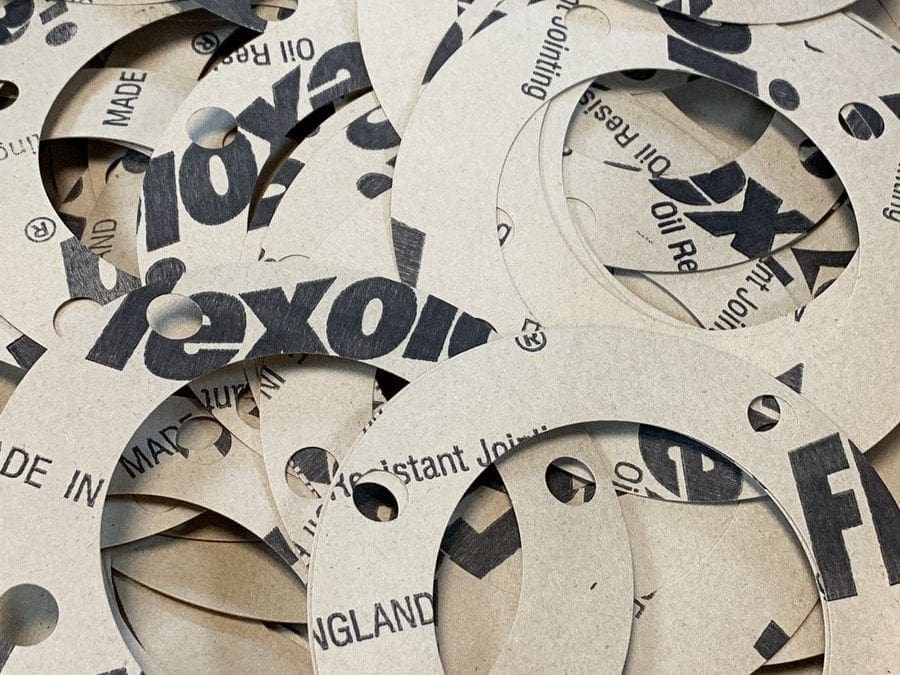Stephens Gaskets is one of the country’s leading manufacturers and suppliers of precision machined components, including those made from Flexoid. Specialising in the production of gaskets, we can design and manufacture the parts in all sorts of shapes, sizes and thicknesses. When it comes to manufacturing you a high quality gasket, we’ve got plenty of different materials to choose from, but if you are looking to create something yourself, we can also provide you with the gasket material.
What is Flexoid?
This plasticised material is great to manufacture gaskets and other precision machined components from. Flexoid paper is created through the infusion of gelatine that results in the creation of a cellulose-based material with a strong resistance to certain substances. Stephens Gaskets offers Flexoid gasket paper in sheet or roll form, with thicknesses ranging from 0.15mm to 2.0mm.
What are the properties of Flexoid gaskets?
Gaskets that have been made with Flexoid gasket paper will boast resistances to a number of different liquids. One of the most attractive properties these gaskets have is their resistance to petrol, oil, fuel and water. Their resistance allows them to seal against these liquids, making them ideal, cost-effective solutions for various applications.
What are they used for?
The automotive industry commonly uses chlorine-free Flexoid gaskets because it requires hard-wearing parts that offer high performance. Furthermore, flexoid’s resistance properties make gaskets made from this material incredibly adaptable for different parts of a device. In addition, manufacturers use Flexoid gaskets in various projects and devices, including front plates, oil filters, timing covers, water pumps, clutches, axle shafts, fuel pumps, oil pumps, engine side covers, thermostats, gearboxes, axle covers, and other automotive applications. Moreover, automotive manufacturers worldwide use Flexoid paper to make components because they can easily manipulate the material into the required shape or size. This makes it ideal for creating replacement vehicle parts. Using Flexoid, we craft duplicate parts when components become discontinued or hard to find, offering a fast, cost-effective, and simple solution.
The limitations of Flexoid gaskets
Flexoid gasket paper is great for automotive applications, however the material has a low tolerance to heat and chemicals – which means it is not often used in other industrial environments. We do not recommend Flexoid for contact with steam, alkalis, and acids; instead, we suggest alternative solutions, typically non-asbestos materials, for such environments.
FAQs
What is Flexoid and what are its properties?
Gelatine infuses Flexoid, creating a plasticised, cellulose-based paper that strongly resists petrol, oil, fuel, and water. It is available in sheet or roll form, with thicknesses ranging from 0.15mm to 2.0mm.
What are Flexoid gaskets used for?
The automotive industry commonly uses Flexoid gaskets for front plates, oil filters, timing covers, water pumps, clutches, axle shafts, fuel pumps, oil pumps, engine side covers, thermostats, gearboxes, and axle covers. They are ideal for creating replacement vehicle parts due to their adaptability and resistance properties.
Why do automotive manufacturers prefer Flexoid paper?
Automotive manufacturers choose Flexoid paper for its ease of manipulation into required shapes or sizes, making it perfect for custom and replacement parts. Its resistance to various liquids ensures high performance and durability in automotive applications.
What are the limitations of Flexoid gaskets?
Flexoid gaskets have a low tolerance to heat and chemicals, making them unsuitable for environments involving steam, alkalis, and acids. We recommend alternative non-asbestos materials for these conditions.
Order yours from a Flexoid Gasket Supplier Today!
Moreover, to find out more information about Flexoid products, head to our website today. Alternatively, you can call 0121 544 5808 to speak to a member of our helpful and friendly team. If you have found this blog helpful, you may wish to read our previous blog on Rubber Gaskets and Seals.

